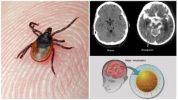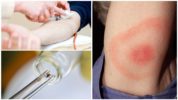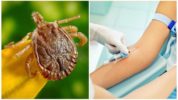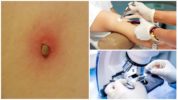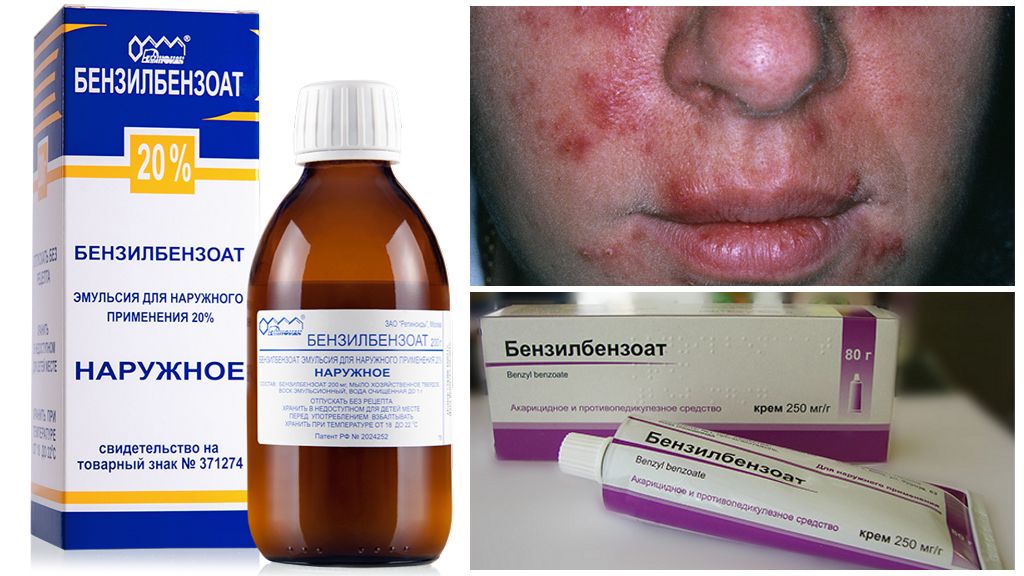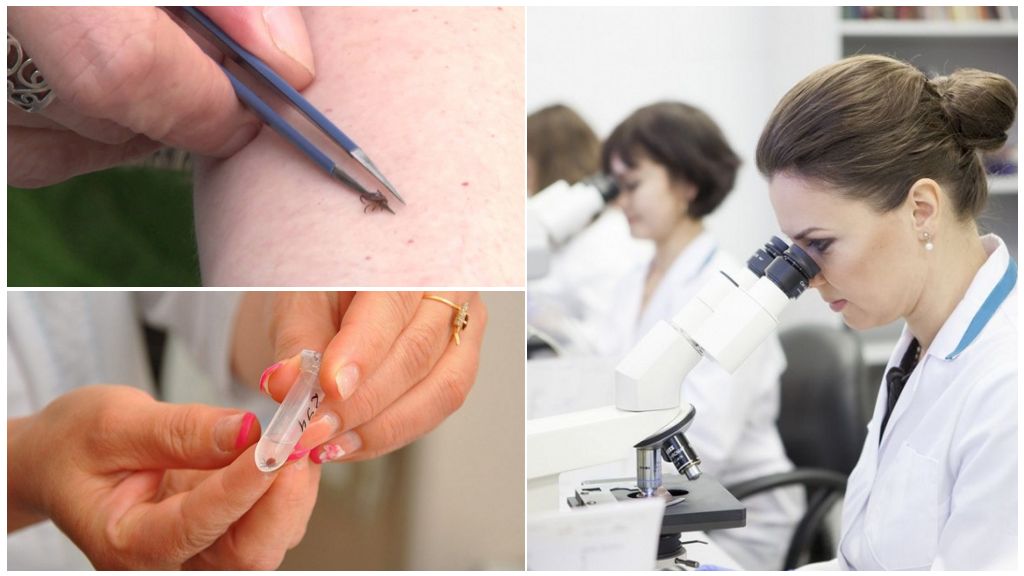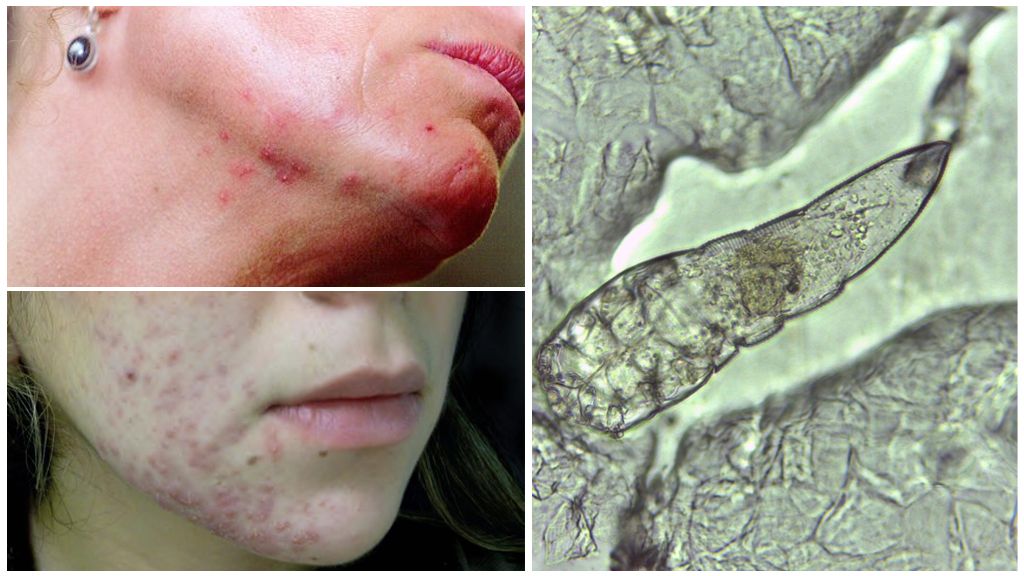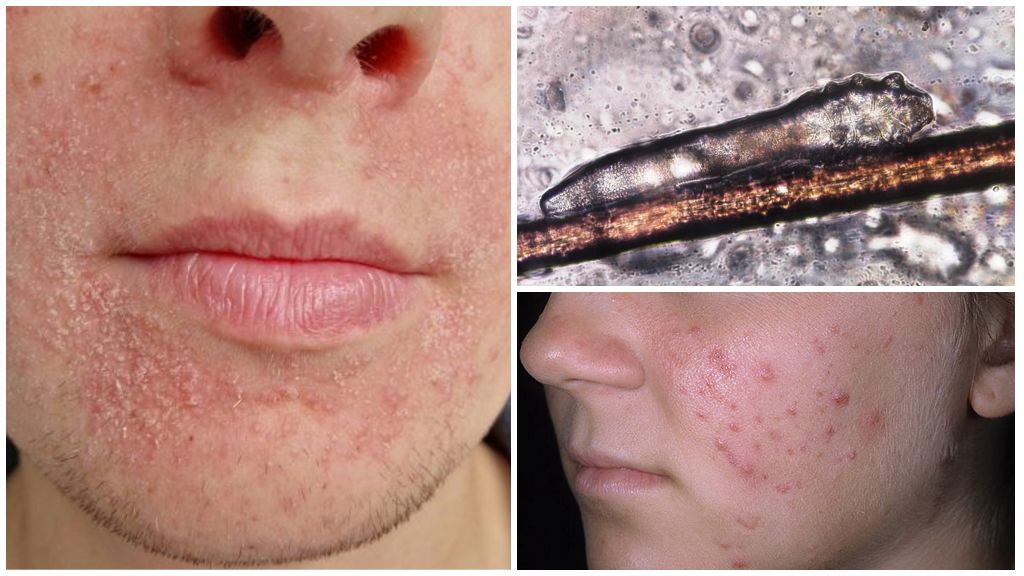- Tick-borne encephalitis
- Laboratory diagnosis of borreliosis
- Diagnosis of tick-borne encephalitis
- Donate blood for analysis
Analysis of tick-borne encephalitis, borreliosis pass 14 days after the bite. Before this, it is recommended to examine the tick itself. If an infection is detected, emergency measures are taken - human immunoglobulin is administered for encephalitis, antibiotics are prescribed for borreliosis.
Tick-borne encephalitis and borreliosis - what is it
The source of the disease are animals, often rodents. Carry the infection ixodid ticks. Causative agent tick-borne encephalitis are viruses, borreliosis or Lyme disease - microorganisms of Borrelia. The incubation period is from 7 days to 50. On average, the first symptoms of the disease appear 14 days after the bite.
Tick-borne encephalitis
The virus is in the blood tick, therefore, the risk of infection increases if improper parasite extraction. Pathological cells are localized in place bitecause inflammation, redness, swelling. Gradually enter the systemic circulation, begin to eat blood cells, than reduce hemoglobin, weaken the protective functions of the body.
By the end of the second week, the virus infects the cells of the brain, spinal cord, blood vessels, the first symptoms of the disease appear. The clinical picture is similar to the flu - high fever, muscle aches, sore throat, rhinitis, fever, as well as nausea, vomiting. After 7 days, the condition normalizes. At this time, either immunity destroys the virus, or allows it to progress. Furthertick-borne encephalitis leads to convulsions, destruction of bone, muscle tissue, dementia, disability, death.
The main drugs for treating the disease are antiviral agents. If no more than 96 hours have passed after the bite, a human immunoglobulin. The favorable outcome depends on the strength of the immune system, the quality of the drugs, the timeliness of therapy.
Important!
Antibodies to tick-borne encephalitis develop after 14 days, so there is no point in donating blood for analysis before this time.
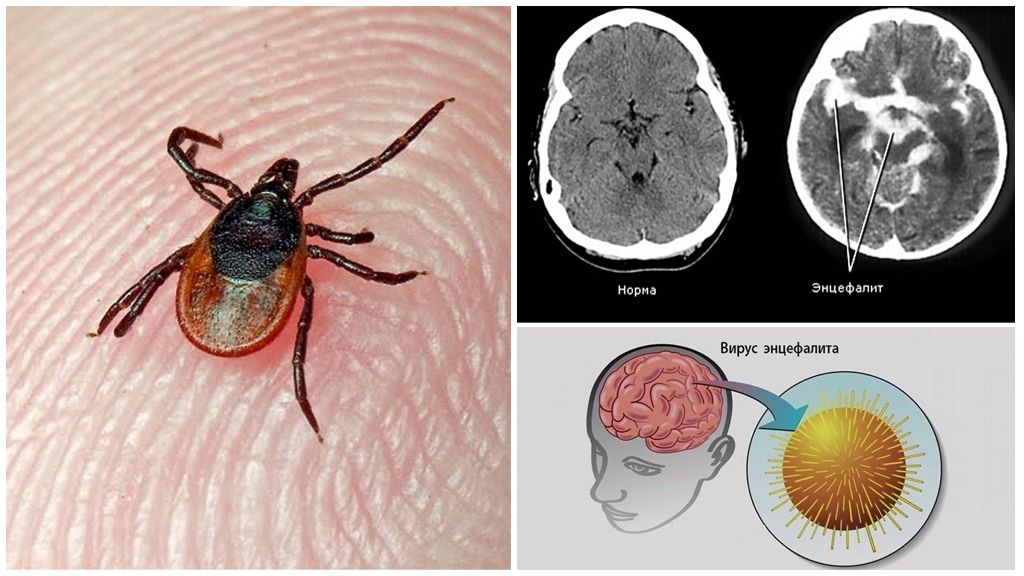
Borreliosis or Lyme disease
A bacterial infection begins to develop after a tick bite infected with borrelia. Microorganisms are transmitted through saliva. The likelihood of infection increases with prolonged suction of the parasite for more than a day.
Initially, pathological microorganisms are localized at the site of the bite. Redness, swelling, slight itching appears. The spot is rapidly increasing in size, reaching 60 cm in diameter. The incubation period lasts an average of 14 days. After this time, the first bacteria die. In the process, they release a strong toxin, which provokes the symptoms of the disease.
The clinical picture is different. Signs of intoxication prevail - temperature, headache, fever, nausea, vomiting, body aches. And also there is photophobia, spasm of the facial nerve, confusion, impaired speech. Within a week, the condition normalizes, one of two things happens - the disease ends with strong immunity or progresses.
The next attack of borreliosis appears after a month.Bacteria affect the nervous system, brain, muscles, internal organs. Severe forms of the disease lead to dementia, disability, death.
Important!
The main medicines are antibiotics. With timely appointment, borreliosis is quickly cured without causing complications. You can diagnose the disease after the onset of the first symptoms. You can donate blood for a preliminary examination 14 days after a bite.
Laboratory diagnosis of borreliosis
Bacteria are present in the affected tissues, fluids - blood, edges of erythrem, cerebrospinal fluid. The efficiency of manipulation is 50%. To obtain a reliable result, differential diagnosis is used taking into account laboratory tests, the clinical picture, the fact of a tick bite.
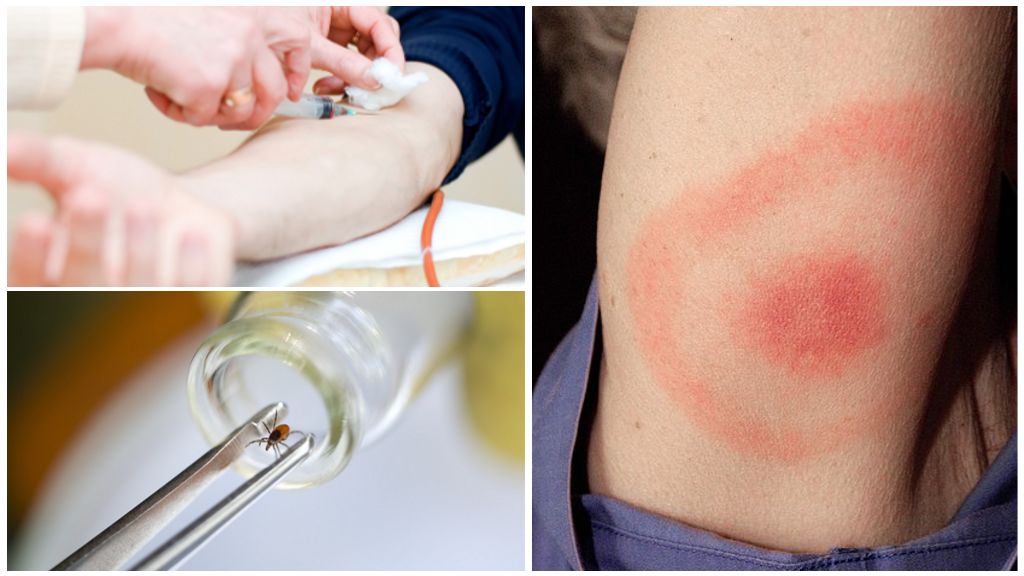
The simplest, most indicative method is serological. Detects the presence of antibodies to spirochete. The material for the study is blood, cerebrospinal fluid, articular fluid.
The main diagnostic methods for Lyme disease:
- Chemiluminescent immunoassay. Serum of venous blood is examined for the presence of IgG, IgM antibodies to the causative agent of infection. The accuracy of the analysis when conducting no earlier than 14 days from the time of the bite is 95%. The proportion of false-positive results is not more than 5%. To confirm the results, additional other diagnostic methods are prescribed.
- Immunoblot (western blot). Increases the accuracy of diagnosis, but gives a negative result for those who are ill again, already has antibodies to borrelia. Venous blood is taken for analysis. The presence of fresh infection is judged by OspC p25. To confirm the result, repeat the analysis after 3-6 weeks.
- PCR with real-time detection. The biomaterial is articular, cerebrospinal fluid. The fence is carried out in a hospital under the supervision of a doctor. The method is advisable at stages when serological studies are uninformative. PCR determines the DNA of living, inactive bacteria, and complements the main diagnostic methods.
- PCR examination of the tick. Detects DNA fragments of pathogens. They send to the laboratory in a special container or a glass jar, on the bottom of which a wet fleece is placed. Arachnids deliver the living, dead or a fragment of the body.
On a note!
Diagnostics by blood test, another material lasts several days. There is no need to specially prepare for the procedure. You just need to come to the clinic at the appointed time.
Laboratory diagnosis of tick-borne encephalitis
The material for the study is venous blood. Liquor in tick-borne encephalitis becomes indicative 14 days after a tick bite.
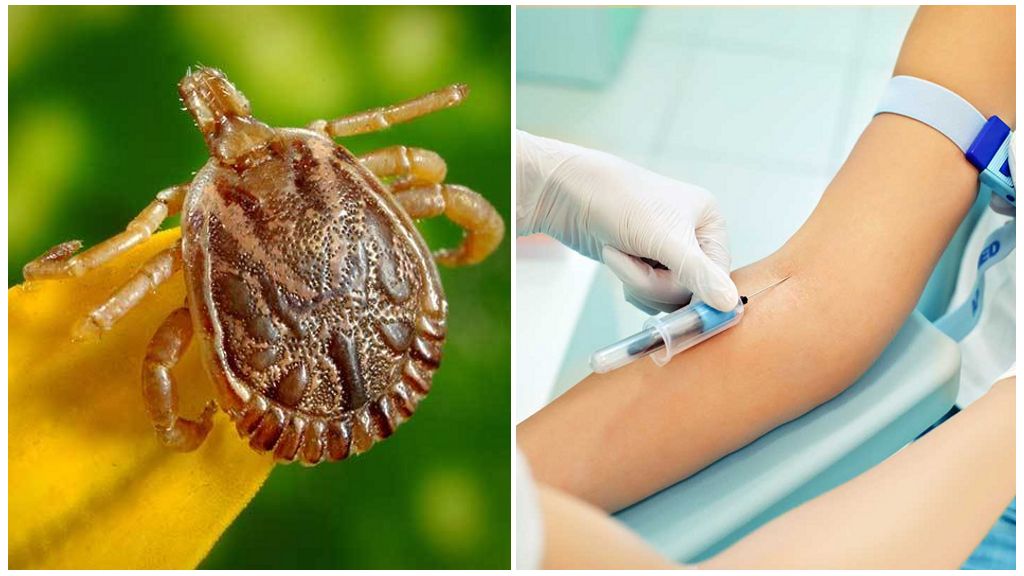
You can establish a diagnosis using 2 methods:
- Immunoassay. ELISA for tick-borne encephalitis detects the presence of antibodies to the virus - IgG, IgM. Immunoglobulins M are the first to respond to the presence of abnormal cells, which indicate a recent infection. Over time, group G forms, which has been present in the body for years. You can get a reliable result already on the fourth day of the disease.
- PCR examination of the tick. The main task is to determine the presence or absence of the virus. If the result is positive, emergency measures are taken to administer immunoglobulin, antiviral drugs are prescribed.
On a note!
Immunological analysis is considered in combination with the analysis of the clinical picture. Tick-borne encephalitis antigen is able to be present in the blood throughout life, without causing vivid symptoms.
Laboratory Diagnostic Cost
A blood test for tick-borne encephalitis and borreliosis is given in public, private laboratories. The procedure in most cases is paid. You can study the tick during the day for 300 - 1000 rubles. Analysis of encephalitis and borreliosis in blood, articular, cerebrospinal fluid - from 400 to 3500 rubles. Additionally, you need to pay for a specialist consultation.
Online Invitro Laboratoriescommon throughout the country, the price range is as follows:
- IgG class antibodies - 440 rubles.
- IgM class antibodies - 630 rubles.
- Laboratory examination of a tick to detect RNA / DNA of pathogens transmitted by ixodid ticks: tick-borne encephalitis, borreliosis (Lyme disease), anaplasmosis, ehrlichiosis - 3200 rub.
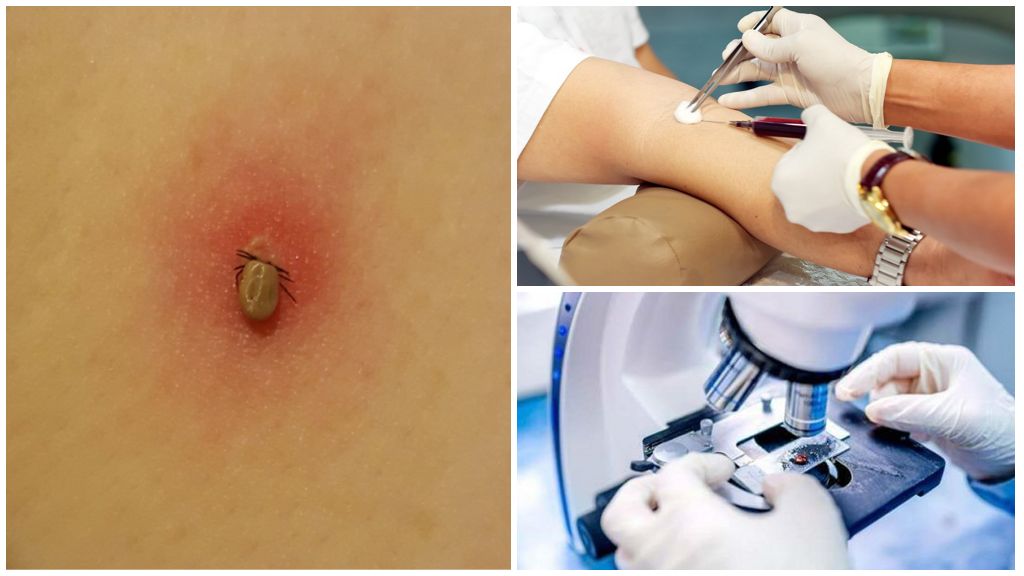
In Moscow, budget laboratories for the analysis of ticks, blood:
- FBUZ "Federal Center for Hygiene and Epidemiology of Rospotrebnadzor". The working hours are from 9.00 to 16.30 daily on weekdays. Moscow, Warsaw highway, d. 19 A., tel. +7 (495) -952-40-98, (PCR, 4 infections). Laboratory study of ixodid ticks.
- FBUZ "Center for Hygiene and Epidemiology in the Moscow Region." Reception of ticks from 9.00 to 16.30 on weekdays. Moscow region, Mytishchi, st. Semashko, d. 2., Laboratory of especially dangerous infections. Tel +7 (495) 582-96-55. Analysis for 4 infections by PCR. Opening hours: Monday-Friday from 09:00 to 15:00; Sat, Sun - non-working days. A simultaneous study of a tick, blood for 4 infections costs 1055 rubles, for the detection of antibodies IgG, IgM - 345 rubles (one class for one infection). The analysis is carried out 1-3 days.
- FBUZ "Center for Hygiene and Epidemiology in Moscow." Tel .: +7 (495) 687-40-47. Opening hours are from 9.00 to 15.30 daily on weekdays (lunch break from 13.00 to 13.30). Moscow, Grafsky Lane, 4, building 2 (entrance from the yard, past the barrier). The analysis is carried out by PCR for 4 infections - CE, BL, MEC, GAC, the price of 1640 rubles. Also Moscow, Warsaw highway, 19 A. Tel .: +7 (495) 952-40-98. Opening hours: Monday-Thursday from 9:30 to 15:00, 9th floor office 925 (lunch break from 12:00 to 13:00). Information on the results is provided from 15:00 to 17:30. The laboratory conducts blood tests for antibodies to tick-borne encephalitis, borreliosis, anaplasmosis, ehrlichiosis.
The average price of an immunoglobulin ampoule (1 ml) is 650 rubles. Free analyzes in Moscow No, but the information is constantly updated on the official website of Rospotrebnadzor.
